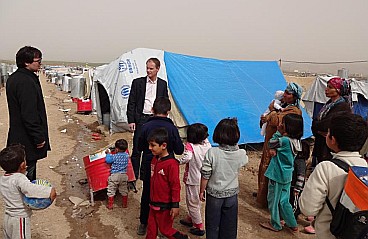Van Bommel: ‘Stop the humanitarian disaster in Camp Domiz’
Van Bommel: ‘Stop the humanitarian disaster in Camp Domiz’
According to Mohamed Hussein, head of the United Nations High Commission on Refugees (UNHCR) in Iraqi Kurdistan, the refugee camp at Domiz is close to ‘explosion’. More than 1,100 Syrian refuges are arriving daily, while the camp is already close to capacity. According to SP Member of Parliament Harry van Bommel, who is visiting the camp, both the Kurdish regional Government (KRG) and the international community must do more to prevent a humanitarian disaster.

SP Member of Parliament Harry van Bommel in Domiz refugee camp
There are now more than 45,000 Syrian refugees housed in the Domiz refugee camp, which lies to the south-east of the Kurdish town of Duhok, sixty kilometres from the Syrian border. The camp is situated in a former army base from the days of Saddam Hussein’s Ba’athist regime and was actually designed for only a few thousand refugees. Last year it was greatly enlarged, but in November reached maximum capacity. According to UNHCR chief Mohamed Hussein, the KRG must make more land available in the very near future in order to further expand the camp. ‘If not at this location then it will have to be somewhere else in the region,’ he insists, though he adds that he is very pleased by the help he has received from the KRG and the Kurdish population. Local people are donating a great deal of goods, and volunteers are arriving at the camp to help.
A tour of the camp illustrates the humanitarian situation and the threat it holds. Many refugees have set up tents on their own initiative, but in places which were not intended for this purpose, with the result that in large parts of the camp there are twice as many tents as there should be. Many tents are inhabited by two families rather than one. The influx of refugees is extremely difficult to manage, with more than 500 a day arriving in January, rising in February to an average 750 and reaching a current level of 1100. Inhabitants complained to Van Bommel about the shortage of water and medicines.
The KRG is working effectively, according to Hussein, to promote an outflow from the camp. On their arrival refugees are subject to background checks, and those who have participated in armed conflict in Syria are not welcome in the camp. Following these checks, refugees are registered with the UNHCR and receive a residency permit which enables them to work in Iraqi Kurdistan. As a result many travel on to Duhok or other towns in the region.
Van Bommel argues that the international community must do more to relieve the acute need. ‘In relation to medicine and sanitary facilities, there is an urgent need for emergency aid,’ he says. ‘In the camp Switzerland’s Doctors Without Frontiers are active, but that isn’t enough. I’ll be looking at whether Dutch aid organisations can also join the effort to improve living conditions in Camp Domiz.’
